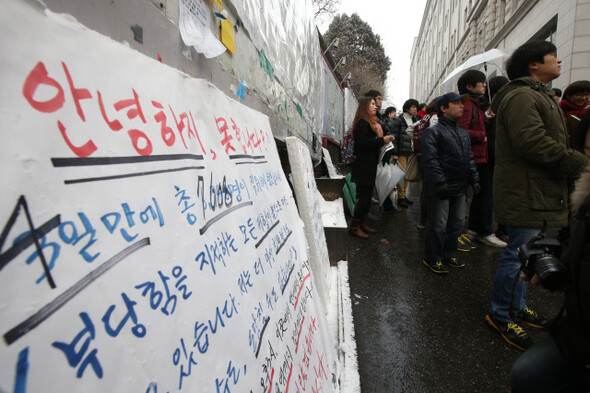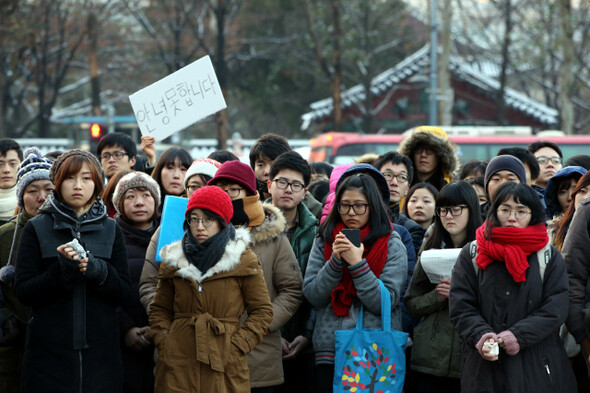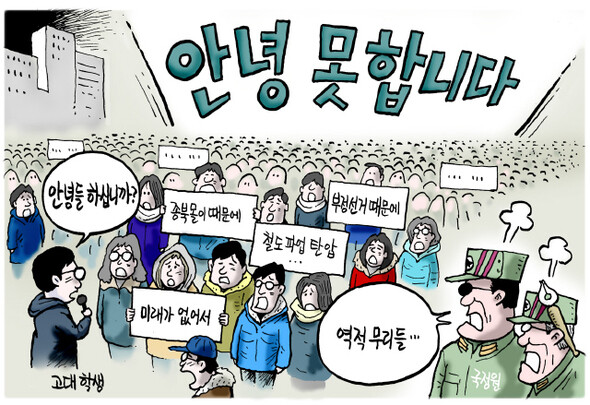hankyoreh
Links to other country sites 다른 나라 사이트 링크
[Reportage] New student movement asks “How are you nowadays?”

By Song Ho-kyun, Kim Hyo-sil, Lee Jae-uk and Kim Mi-hyang, staff reporters
“How are you nowadays?” “I’m not okay!”
When the speaker asked the question, about 300 people responded together in one voice.
Around 3 pm on Dec. 14, the rear gate to the College of Political Science and Economics at Korea University in Seoul was buzzing with people despite the flakes of snow drifting down.
Students and citizens had gathered in support of a large hand-written poster titled “How are you?” which Ju Hyun-woo, 27, a business student at Korea University, put up on campus on Dec. 10.
“I just want to ask you, how are you?” the poster asked, referring to the controversy about privatizing the railroads and suspending railroad workers from their positions; the electricity transmission tower controversy in Miryang, South Gyeongsang Province; and the National Intelligence Service’s (NIS) interference in the 2012 presidential election. “I just want to know, are you okay with ignoring these things because they’re not happening to you, or are you hiding behind the self-justification of political apathy?” Ju’s questions are generating a heated reaction both online and offline.
As of the morning of Dec. 16, more than 220,000 netizens had liked the Facebook page that Ju made.
Similar posters are going up not only at Korea University but also at universities around South Korea.

According to the official Facebook page, as of Dec. 15, more than 100 handwritten posters had gone up, with 50 at Korea University, 22 at Seoul National University, 5 at Chung-Ang University, and 3 at Sungkyunkwan University, along with an uncountable number of messages of support posted online through social media.
The reason that the hand-written posters, which had become a rare sight on university campuses, have emerged as such a powerful phenomenon is that they have used the language of everyday life instead of political catchphrases, which helps students relate to them.
“Usually, the posters urge us to do something, but I was struck by how this one asked us how we we’re doing nowadays,” said Jeon Hyun-sik, 22, a student at Korea University who took part in the day’s event. “I ended up thinking about myself and a lot of other things as well.”
“When I read the poster, I felt like my blood was boiling,” said Seo Jin-sol, 20, a math student at the same university. “Most posters communicate information, but this one struck an emotional chord. I felt ashamed of myself for having thought that everything was okay.”
“The news, columns, and political posters produced by the so-called progressives are expressed in stiff and academic language, which limits their ability to move people emotionally,” said Eom Ki-ho, a scholar of cultural studies. “This poster was able to have a raw emotional impact on people because it used everyday language, the words normally used among friends.”
The crowd of people who gathered at the event on Dec. 14 completely filled the rear gate to the College of Political Science and Economics and spilled out onto the steps leading up to the building. Citizens who came out to support the students stacked up bread, drinks, and umbrellas on one side.
When Ju grabbed the microphone, the crowd erupted with applause. “I think the response has been so intense not because my message was well-written but rather because so many people have not been permitted to speak. But when you think about it, you don’t need permission to speak,” Ju said.
Experts say one thing that helped Ju’s words reach out to people was that young people facing uncertain futures were able to identify with his message. In a situation where the only way to get ahead is by stepping on others, these people’s hearts were moved by the feeling that they were all in the same boat.
“Today, everything is dominated by the older generation, which lived during a time that focused on growth. Young people are leading the call to reflect on their own lives,” said Yonsei University professor Cho Han Hye-jeong.
“If the sense of generational deprivation for people in their 20s and 30s that was expressed by the phrase ‘880,000 generation’ [which refers to young people who only earn 880,000 won a month at part time jobs] became a philosophy of personal development for young people. The dissatisfaction that has been building up in society is spreading and being expressed through the ordinary phrase ‘how are you doing nowadays?,’” said Lee Taek-gwang, a professor at Kyunghee University. “Korean society has taught young people to seek their own safety by working hard on their academic qualifications, but the opposite phenomenon is appearing.”
Attending the event were students not only from Korea University but also from Kookmin University, Sogang University, Yonsei University, and Hankuk University of Foreign Studies. These students are viewing current issues such as the railroad workers’ strike, the conflict over the electricity transmission towers in Miryang, and the NIS election interference scandal as problems affecting every single Korean.
“After the railroad unionists were removed from their positions, I was enraged at the injustice of it. By itself, the poster was not enough. We planned this event today because we thought that our position would be more meaningful when we demonstrated it through action,” said Kang Tae-kyung, 25, a philosophy student who organized the event along with Ju.
“I had never attended a rally before, but I wasn’t able to sit still after I saw the message on the poster,” said Kim Hyun-jeong, 22, a student at Hanshin University. “I felt that suspending thousands of railroad unionists from their positions because they had taken part in a strike to stop privatization was so unjust and backward.”
There are also signs of interest among high school students. “It was strange that former prosecutor-general Chae Dong-wook and prosecutor Yun Seok-yeol, who were investigating the National Intelligence Service, resigned and were punished,” said Kim Hyun-gon, 17, who came all the way to Seoul from Bonghwa, North Gyeongsang Province.
Kim said, “I have felt that something was wrong with the world for a long time, but there was nobody in the area I live - the Daegu and North Gyeongsang region - who agreed with me. When I saw the poster [at Korea University], I was overjoyed at the thought that there were people who felt the same as me.”
It appears that a variety of factors have been in play. One is the oppression of freedom of expression, in which even speaking one’s opinions freely has come to be regarded as taboo. Another is the fundamental crisis faced by democracy in Korea, which was revealed by the extreme example of the NIS scandal.
“I hope that this is an opportunity for us to think about why we are silently maintaining the status quo without punishing the people who are responsible and why we continue to find the powerful so attractive,” said Jeong Da-un, 24, a student at Sogang University.
“When I saw these posters, I realized that people have quite a few things to say,” said Korea University student Lee Hyun-min, 21. “All of the things that had been held back came bursting out all at once.”
“The series of incidents that overturned the fundamentals of our democratic system, including the National Intelligence Service case, have made university students speak out,” said Yoon Sang-chul, a professor at Hanshin University. “Young people are viewing the structural problems in our society as their own problems and are drawing particular attention to them.”

After the event was over, participants attended a mourning service for Miryang Resident Yu Han-suk, which was held at Seoul Plaza on the same day. At the service, they handed out hot packs and soft drinks to Miryang residents holding a sit-in after shouting the slogan “How are you doing nowadays? We‘re not okay!” with them. One student held a placard that said, “We can’t use electricity made with the tears of Miryang!”
Next, they went to Seoul Station square to join in the Nationwide Demonstration for Ending Privatization of Railroads and Oppression of Workers. When about 300 university students arrived at Seoul Station carrying placards saying “How are you doing nowadays?” a cheer erupted from the 12,000 or so labor demonstrators there.
There is no way of knowing in what way the “how are you doing nowadays?” phenomenon will develop. Some pundits see it as a passing fad, while others believe that it hints at the formation of a new kind of campus culture.
The question ‘how are you doing nowadays?’ is still little more than a single image,“ said Lee Taek-gwang. ”If this is going to expand, it cannot end with mere bonding and support. There will need to be a movement to set up associations, and young people will need to start a political movement.“
Please direct questions or comments to [english@hani.co.kr]

Editorial・opinion
![[Column] Park Geun-hye déjà vu in Yoon Suk-yeol [Column] Park Geun-hye déjà vu in Yoon Suk-yeol](https://flexible.img.hani.co.kr/flexible/normal/500/300/imgdb/original/2024/0424/651713945113788.jpg) [Column] Park Geun-hye déjà vu in Yoon Suk-yeol
[Column] Park Geun-hye déjà vu in Yoon Suk-yeol![[Editorial] New weight of N. Korea’s nuclear threats makes dialogue all the more urgent [Editorial] New weight of N. Korea’s nuclear threats makes dialogue all the more urgent](https://flexible.img.hani.co.kr/flexible/normal/500/300/imgdb/original/2024/0424/7317139454662664.jpg) [Editorial] New weight of N. Korea’s nuclear threats makes dialogue all the more urgent
[Editorial] New weight of N. Korea’s nuclear threats makes dialogue all the more urgent- [Guest essay] The real reason Korea’s new right wants to dub Rhee a founding father
- [Column] ‘Choson’: Is it time we start referring to N. Korea in its own terms?
- [Editorial] Japan’s rewriting of history with Korea has gone too far
- [Column] The president’s questionable capacity for dialogue
- [Column] Are chaebol firms just pizza pies for families to divvy up as they please?
- [Column] Has Korea, too, crossed the Rubicon on China?
- [Correspondent’s column] In Japan’s alliance with US, echoes of its past alliances with UK
- [Editorial] Does Yoon think the Korean public is wrong?
Most viewed articles
- 1‘We must say no’: Seoul defense chief on Korean, USFK involvement in hypothetical Taiwan crisis
- 2N. Korean delegation’s trip to Iran shows how Pyongyang is leveraging ties with Moscow
- 3[Column] Park Geun-hye déjà vu in Yoon Suk-yeol
- 4Amnesty notes ‘erosion’ of freedom of expression in Korea in annual human rights report
- 5‘Weddingflation’ breaks the bank for Korean couples-to-be
- 646% of cases of violence against women in Korea perpetrated by intimate partner, study finds
- 7[Reportage] On US campuses, student risk arrest as they call for divestment from Israel
- 8“Parental care contracts” increasingly common in South Korea
- 9[Interview] Dear Korean men, It’s OK to admit you’re not always strong
- 10Korean government’s compromise plan for medical reform swiftly rejected by doctors